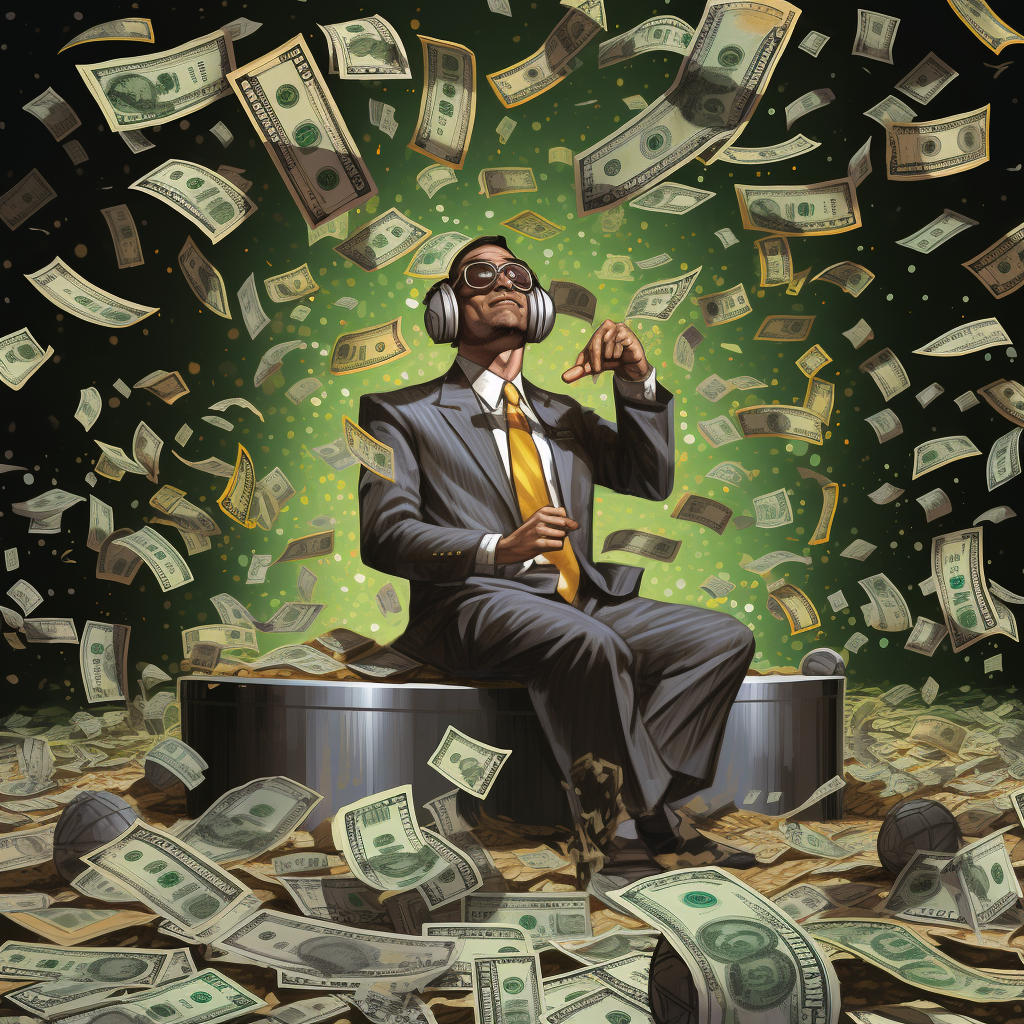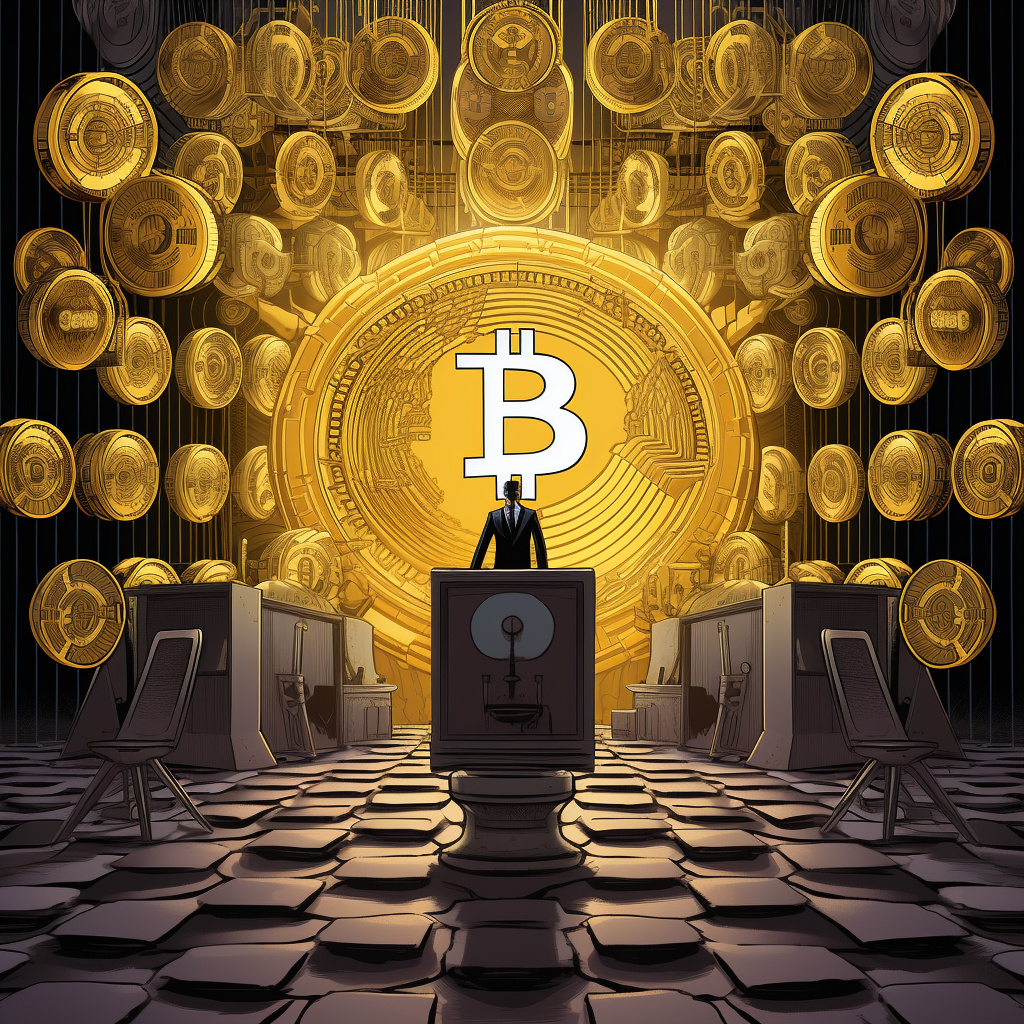How Bitcoin Can Make Money Better for Us All
Discover the journey of money from barter system to Bitcoin, and how this digital asset could revolutionize our monetary system.

Imagine a world where your money is safe, secure, and operates under rules you understand and can trust. Money has been a part of human society for thousands of years, serving as a tool for trade and a measure of wealth. But what if we could design it better? A form of money that is more secure, transparent, and democratic? Enter Bitcoin: a new breed of digital currency.
Introduction
Money has been a constant in human history. From the earliest days of bartering to the complex financial systems we have today, it has been an integral part of our lives.
At its core, money is a symbol of trust!
We trust that it holds value, and others will accept it in exchange for goods and services. However, over time, we've begun to see cracks in the system, prompting us to ask: could we make better money?
That's where Bitcoin comes into play. Introduced in 2009, Bitcoin is a digital currency that operates without a central authority. It's built on a transparent, secure network of computers, called blockchain, that keeps an open, verifiable record of all transactions.
But what truly sets Bitcoin apart is its scarcity. Unlike traditional currencies, which can be printed by governments and lead to inflation, the total number of Bitcoins that will ever exist is capped at 21 million, making it a potentially more reliable store of value.
So, can we make better money?
Hold onto your seats as we venture into a fascinating journey through time and technology, exploring the transformative potential of Bitcoin as the money of the future. Let's begin!
How Money Has Evolved, Since Forever
Understanding the journey of money takes us back to the dawn of civilization. Money didn't start with coins, notes, or even digital bits on a computer. It began with a simple idea: bartering.
The Barter System
Our earliest ancestors didn't have a concept of money as we know it. Instead, they used a barter system—direct exchange of goods and services.
For example, one could trade a bushel of grain for a piece of pottery.
However, as you can imagine, this system had its challenges. Finding someone who wanted your goods and had what you needed was difficult—a problem economists call the "double coincidence of wants."
The barter system also made it hard to decide how much a particular good or service was worth in comparison to others.
Physical Currency
As societies grew and trade expanded, physical forms of money appeared. These included shells, beads, and eventually precious metals like gold and silver.
These commodities had intrinsic value, were durable, and could be carried and counted easily.
They marked a significant improvement over bartering, but not without drawbacks. Physical money could be lost, stolen, or even counterfeited. And carrying large amounts of it could be cumbersome.
Digital Money
Fast forward to the 20th century, the dawn of the digital age brought along digital money—cards, online banking, and electronic transfers.
Suddenly, we could carry and transfer vast sums with a click!
Digital money proved more secure and convenient than its physical counterpart, and the advent of e-commerce drove its widespread adoption.
However, as we became more dependent on digital money, we also exposed ourselves to new risks like cybercrime and data breaches.
The journey from the barter system to digital money was a response to the ongoing quest for more efficiency and convenience in transactions. While each evolution solved some problems, they introduced others.
The question then is: could there be a system that combines the advantages of these forms while minimizing the disadvantages? This is where Bitcoin, a new form of digital currency, comes into the picture, but more on that later.
Let's first explore what makes money 'good'.
What Makes Good Money?
To answer this, we need to look at the universally recognized properties that make for 'good money'.
Economists and financial experts commonly agree that money must have six key characteristics: durability, portability, divisibility, uniformity, limited supply, and acceptability.
Let's dive into each.
Durability: Money must stand the test of time and use. If it falls apart, corrodes, or otherwise deteriorates, it loses its utility and thus its value. This is why we don't use perishable goods as money and why durable metals like gold have been used throughout history.
Portability: Good money needs to be easy to carry around and to transfer. The more portable money is, the easier it is to use for transactions. That's why despite their value, items like real estate or livestock are inconvenient as money.
Divisibility: Money should be easily divisible into smaller units without losing its total value. For example, two $10 bills hold the same value as one $20 bill. This is essential because it allows us to price and pay for goods of varying values.
Uniformity: Every unit of money should be the same as every other unit. In other words, you don't have to question whether one $10 bill is somehow inferior to another. This consistency builds confidence in a currency.
Limited Supply: Money must be scarce to maintain its value. If there's too much money available, it becomes less valuable—an economic phenomenon known as inflation. That's why making counterfeit money is illegal; it undermines the scarcity (and thus value) of money.
Acceptability: Finally, for money to be 'good', everyone must accept it as a form of payment. This broad acceptability is often guaranteed by governments, which declare a currency as legal tender.
These are the basic qualities of good money. However, our current global money system isn't perfect. Let's take a closer look at why this is and how we can make improvements.
What Makes Bad Money?
While we have discussed the qualities that make for 'good' money, it's also essential to understand what makes 'bad' money. Bad money can have detrimental effects on economies and societies, causing financial instability and loss of trust in the system.
Here are a few common traits of bad money:
High Inflation Rates: When a currency's supply increases too quickly, it can lead to high inflation rates. This erodes the purchasing power of money—each unit of currency buys less than it did in the past. In extreme cases, it can lead to hyperinflation, where the prices of goods and services increase rapidly and uncontrollably, rendering the currency almost worthless.
Centralization: Centralization refers to the control of a currency by a single authority, like a central bank or government. While this can provide stability, it also leads to vulnerability. Bad policy decisions, corruption, or economic mismanagement can negatively impact the value of the currency. Additionally, central authorities can arbitrarily alter the money supply, leading to unpredictability.
Lack of Transparency: With traditional currencies, transactions often occur behind closed doors. This lack of transparency can lead to corruption, illicit activities, and a general lack of trust in the system. It also makes it harder for individuals to understand how money is flowing within the economy.
Limited Accessibility: In many parts of the world, access to banking and financial services is limited or non-existent. This lack of access makes it difficult for people to save, invest, or conduct transactions, restricting economic growth and fostering inequality.
Insecurity: Traditional forms of money can be stolen, counterfeited, or otherwise tampered with. This insecurity adds risk to holding and using money.
These are some of the critical flaws that can make 'bad money'. Addressing these issues requires a new approach to the way we think about and handle money—an approach that Bitcoin, among others, is seeking to provide.
But before we get into that, let's delve into the flaws of our current global money system in more detail.
How Our Current Global Money System is Flawed
Even though money has evolved significantly over the centuries, the global money system we have today is far from perfect. It's plagued by a variety of flaws that have significant implications for societies, economies, and individuals. Let's delve into some of these issues:
1. Unlimited Money Printing: One of the most concerning issues with today's fiat currencies is that they're not backed by a physical commodity like gold. This gives central banks the ability to create money out of thin air—a practice that can lead to serious economic issues such as inflation, currency devaluation, and even financial crises.
2. Runaway Inflation: As we've touched upon earlier, rapid increases in the money supply can lead to high inflation rates. This erodes the purchasing power of a currency, affecting the economy and people's livelihoods. Hyperinflation scenarios, like the ones witnessed in Zimbabwe and Venezuela, are extreme examples of how bad this can get.
3. Negative Interest Rates: To stimulate economic growth, central banks sometimes set negative interest rates. This means that instead of earning interest on their deposits, savers are effectively charged to store their money. This discourages saving and encourages spending, which can lead to an unstable economy.
4. Savers Forced to Take Risks: With interest rates near zero or even negative in many parts of the world, savers are being forced to take on more risk to achieve a reasonable return on their investments. This often means investing in the stock market, real estate, or other volatile assets, which not everyone is comfortable or equipped to do.
5. Authoritarianism on the Rise: In some countries, governments exert significant control over the financial system, using it to monitor, control, and even seize citizens' assets. This infringement on financial freedom is a concerning trend.
6. Refugees Facing Capital Controls: In conflict-ridden regions or areas facing economic collapse, people often face strict capital controls that prevent them from taking their money across borders. This can leave refugees and migrants in a particularly vulnerable situation.
7. Physical Cash Disappearing: As the world becomes increasingly digital, physical cash is rapidly disappearing. While this shift has its advantages, it also leaves societies vulnerable to issues like cybercrime, technical failures, and increased surveillance.
8. Financial Exclusion: Despite technological advances, a significant portion of the global population remains unbanked or underbanked. These individuals lack access to essential financial services, leading to a cycle of poverty and economic inequality.
These are just some of the flaws with our current global money system. They underline the need for a new kind of money that can address these issues—a kind of money that is decentralized, secure, transparent, and accessible.
What is the Common Thread? (The Need to Trust Others—and the Abuse of Trust)
The one element that underpins all these problems with our current global money system is trust. Let me illustrate this with a simple analogy.
Think of a game of Monopoly!
The bank in Monopoly gives out money, takes it back, calculates interest, and generally acts as a controlling authority. When you play, you inherently trust that the "bank" will function as expected. It's a similar situation in our real-world financial systems.
We rely on banks to keep our money safe, governments to ensure economic stability, and currency to retain its value. We trust these institutions to play fair.
However, what happens when that trust is violated?
For instance, let's say in the middle of your Monopoly game, the player acting as the bank starts handing out extra cash to their friends, devaluing the money for everyone else.
That would ruin the game, right? This is essentially what happens during unchecked money printing or economic manipulations.
This reliance on trust is the crux of many of the flaws we've identified in our global money system. From runaway inflation to authoritarian control over finances, the abuse of this trust can lead to a myriad of problems.
Thus, the ultimate question becomes, can we create a system where we don't have to depend on trust? A system that functions fairly, transparently, and reliably, without the need for a central authority?
This brings us to our next point: Can we make better money? Let's explore this thought further.
Can We Make Better Money?
Imagine a system where money is not just a means of exchange, but also a tool of empowerment. A system that is not controlled by any central authority, doesn't suffer from the flaws of traditional currencies, and doesn't rely on trust.
It may sound like a distant dream, but with the advent of technology, it is more than just a possibility!
A better form of money would have to be decentralized. In a decentralized system, the power is spread out among its users. There are no central authorities like banks or governments that control how the system operates.
Instead, it functions on a network of computers where each participant plays an equal role.
This kind of system would be much more transparent than the one we currently have. Every transaction would be visible on the network, making it almost impossible for fraudulent activities to go unnoticed. This transparency would make it significantly harder for any one party to manipulate the system for their benefit.
Most importantly, this system would not rely on trust. Instead of trusting a bank to hold your money or a government to keep inflation in check, you would only have to trust the technology and the immutable laws of mathematics. This eliminates the risk of trust being violated and takes us one step closer to a fair financial system.
The question then arises: is there a form of money that embodies all these characteristics? The answer is a resounding yes, and it's called Bitcoin.
Let's dive deeper into this revolutionary concept.
Enter Bitcoin
In 2009, an entity known by the pseudonym Satoshi Nakamoto introduced the world to Bitcoin - a digital currency like no other.
Bitcoin is not just another form of money; it represents a paradigm shift in our concept of what money can be. It’s self-sovereign, scarce, and open to all.

Self-sovereign
Bitcoin is self-sovereign, which means you have total control over your wealth.
There is no central authority, like a bank or government, that can freeze your account or seize your assets.
You have complete control over your Bitcoin, and you can send or receive it anywhere in the world without needing permission from anyone.
Scarce
Bitcoin is designed with scarcity built into its core. There will only ever be 21 million Bitcoins in existence!
Unlike traditional money, where central banks can print as much as they want, leading to inflation and devaluation, Bitcoin’s scarcity mimics the finite nature of physical assets like gold, which have historically been used as a store of value.
This ensures that Bitcoin retains its value over time.
Open to All
Bitcoin is an inclusive financial system that is open to all. Anyone with an internet connection can participate in the Bitcoin network.
It doesn't matter who you are or where you come from.
This is particularly empowering for the billions of people worldwide who are unbanked or underbanked by the traditional financial system.
The Big Idea: No Need for Trust
The most revolutionary aspect of Bitcoin, however, is that it eliminates the need to trust anyone.
With Bitcoin, transactions are verified by a decentralized network of computers (called miners) using cryptography, making it nearly impossible to cheat the system. The entire transaction history is stored on a public ledger known as the blockchain, bringing unparalleled transparency and security.
Trust in institutions, governments, and banks is no longer needed because trust is replaced by verifiable, mathematical certainty. This fundamental shift can potentially change how the world views and uses money.
In essence, Bitcoin, as a form of digital money, provides an answer to the question: "Can we make better money?"
Not only can we make it, but it's here, and it's reshaping the financial landscape in ways we're only just beginning to understand!
In Summary
From the days of bartering to the advent of digital money, the evolution of money has been a testament to our constant pursuit of a better medium of exchange. Money, in its essence, is a tool of trust. However, our current global monetary system is fraught with issues—from unlimited money printing leading to inflation, to the potential abuse of trust in centralized financial systems.
This exploration brings us to a potential solution in the form of Bitcoin—a self-sovereign, scarce, and open-to-all digital currency. The essence of Bitcoin lies not just in its digital nature, but in its revolutionary departure from the need to trust any central authority. With its decentralized design, Bitcoin puts you in full control of your wealth, and its built-in scarcity protects against the threat of devaluation. This openness to all, without the barriers prevalent in traditional financial systems, brings the promise of a more inclusive economy.
While Bitcoin has certainly piqued the world's curiosity, its potential to make better money and reshape the financial landscape is what truly makes it fascinating. As we look to the future of money, it's clear that Bitcoin and other cryptocurrencies have a significant role to play.
Conclusion
So, can we make better money? With Bitcoin, the answer appears to be a resounding yes. But like any groundbreaking innovation, it comes with its own set of challenges and requires a deeper understanding. I encourage you to embark on this journey of learning about Bitcoin and the vast potential it holds. The future of money might just be a few clicks away.
If you've learned something new about Bitcoin today, I have a small favor to ask: please share this article on your social media. By doing so, you'll help us educate more people about money and Bitcoin, and enable us to continue providing insights into this transformative technology. The more we share, the closer we come to a future where money works better for all of us.
Thank you for reading this far, and here's to a future where we continue to learn and grow together.
